The Steinmusic DE2 CD Enhancer
| The Steinmusic DE2 CD Enhancer |
| Turn Up the Quiet |
|
|
|
March 2010 |
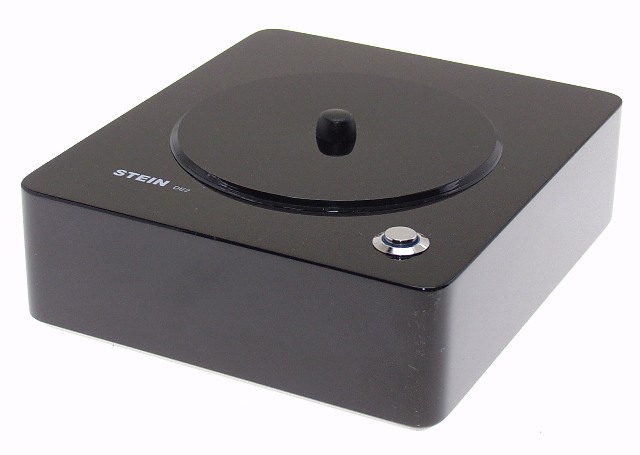
 Before I begin delving into the performance of the Steinmusic DE2 CD Enhancer, I’d like to tell you a bit about myself. I am an avid music lover and I guess, what you’d call an audiophile, for lack of a better term. I prefer to think of myself as someone who has discovered how wonderful it is to hear recordings played back at a level of truthfulness that takes me to the performance space, while sitting in the comfort of my own home. For the last 15 years or so I have been buying audio equipment, reading about it and building relationships with like-minded individuals. Some of these individuals have had many more years of involvement in this hobby than me, including retailers, journalists and designers of products. In addition to the aforementioned, there are numerous other music lovers and musicians. This brings me to the next bit of information that I’d like to share with you: I’m a musician, a “jazz” musician who happens to play drums. I’ve been playing drums all of my life and it’s how I’ve earned a living in one way or another. I’m also a professor of jazz drums at two major institutions in New York City. So, it’s through playing and listening to music that I’ve come to appreciate it reproduced on “high performance audio systems.” That said, I currently own three systems in my modest northern New Jersey home, ranging in size, price range and vintage [see sidebar].
Before I begin delving into the performance of the Steinmusic DE2 CD Enhancer, I’d like to tell you a bit about myself. I am an avid music lover and I guess, what you’d call an audiophile, for lack of a better term. I prefer to think of myself as someone who has discovered how wonderful it is to hear recordings played back at a level of truthfulness that takes me to the performance space, while sitting in the comfort of my own home. For the last 15 years or so I have been buying audio equipment, reading about it and building relationships with like-minded individuals. Some of these individuals have had many more years of involvement in this hobby than me, including retailers, journalists and designers of products. In addition to the aforementioned, there are numerous other music lovers and musicians. This brings me to the next bit of information that I’d like to share with you: I’m a musician, a “jazz” musician who happens to play drums. I’ve been playing drums all of my life and it’s how I’ve earned a living in one way or another. I’m also a professor of jazz drums at two major institutions in New York City. So, it’s through playing and listening to music that I’ve come to appreciate it reproduced on “high performance audio systems.” That said, I currently own three systems in my modest northern New Jersey home, ranging in size, price range and vintage [see sidebar].
These systems have gone virtually unchanged for years except when an occasional upgrade or tweak was needed (and for whom I have to thank my friend Clement Perry).
Now I’d like to get into my observations of the Steinmusic DE2 CD Enhancer . This device is what I guess you would call a tweak, though it doesn’t actually affect the sound of your system. Instead, the DE2 affects the sound of your silver discs, whether they’re CD, CDR, SACD, HRX and/or DVD based. How exactly does the DE2 work? The DE2’s designer Holger Stein wrote: “…the DE2 employs a specially developed electro-magnetic sequence to reorganize a discs’ electro-magnetical structure to a more natural less stressy state. Best results will be obtained when demagnetizing both sides of a disc.”
The DE2 is a very attractive yet unassuming high-gloss black box with a spindle on the top and a single silver button. Simply place the disc on the spindle and press the button. A soft-white indicator light comes on for about 15 seconds. A single beep followed by the light fading to off tells you your disc is ready to go. Stein (the man), recommends treating both sides of a disc so treating both sides might have taken 30-seconds tops. That’s it! Treating a CD is a cinch and it took only a matter of seconds to hear the results.
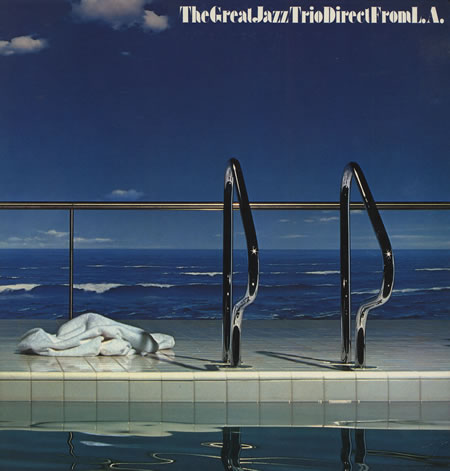 I am a big fan of The Great Jazz Trio and many of its incarnations. Its mainstay has been the late great Hank Jones at the piano, teamed with, in this recording, Ron Carter on bass and Tony Williams on drums. The CD is The Great Jazz Trio’s Direct From LA[East Wind VCCJ 4006]. I first played the disc without any treatment from the DE2. It sounded quite nice, as this is a fairly well recorded disc, a 24 Bit re-master from what was originally released as a Japan only “direct to disc” LP that I have had for many years. The track I chose was Duke Ellington’s, “Satin Doll.” After “treating” the disc with the DE2, I immediately heard an improvement in clarity in Tony Williams’ hi-hat cymbals. They sounded more like what they actually are: two cymbals opening and closing together while being struck with a stick. The sound had more clarity than before the treatment. After the treatment, Ron Carter’s bass had slightly more separation, attack and clarity, and Hank Jones’ piano notes rung with more sparkle. All of this increased clarity was for the better, to my ears, and what I want to hear in terms of truthfulness of tone on instruments that I know so well.
I am a big fan of The Great Jazz Trio and many of its incarnations. Its mainstay has been the late great Hank Jones at the piano, teamed with, in this recording, Ron Carter on bass and Tony Williams on drums. The CD is The Great Jazz Trio’s Direct From LA[East Wind VCCJ 4006]. I first played the disc without any treatment from the DE2. It sounded quite nice, as this is a fairly well recorded disc, a 24 Bit re-master from what was originally released as a Japan only “direct to disc” LP that I have had for many years. The track I chose was Duke Ellington’s, “Satin Doll.” After “treating” the disc with the DE2, I immediately heard an improvement in clarity in Tony Williams’ hi-hat cymbals. They sounded more like what they actually are: two cymbals opening and closing together while being struck with a stick. The sound had more clarity than before the treatment. After the treatment, Ron Carter’s bass had slightly more separation, attack and clarity, and Hank Jones’ piano notes rung with more sparkle. All of this increased clarity was for the better, to my ears, and what I want to hear in terms of truthfulness of tone on instruments that I know so well.
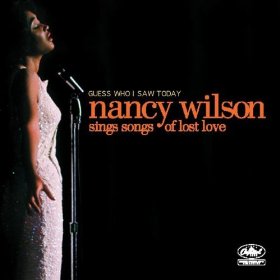 Next up was Miss Nancy Wilson, from the CD, Guess Who I Saw Today: Nancy Wilson Sings Songs Of Lost Love, [Capitol]. The Capitol recordings from this period are works of art and include artists such as, Nat King Cole, Frank Sinatra, June Christy and Peggy Lee, among others. In fact, Capitol has been referred to as “The House That Nat Built”. This recording is typical of the sound of Capitol and the era, and I love the sound. Big room, beautifully recorded vocals, front and center, usually with a crack jazz rhythm section and lush strings, tight horn arrangements, by some of the best ever arrangers such as, Nelson Riddle, Billy May, Jimmy Jones, Gerald Wilson and in this case Oliver Nelson, who may be best known for his classic recording, Blues In The Abstract Truth.
Next up was Miss Nancy Wilson, from the CD, Guess Who I Saw Today: Nancy Wilson Sings Songs Of Lost Love, [Capitol]. The Capitol recordings from this period are works of art and include artists such as, Nat King Cole, Frank Sinatra, June Christy and Peggy Lee, among others. In fact, Capitol has been referred to as “The House That Nat Built”. This recording is typical of the sound of Capitol and the era, and I love the sound. Big room, beautifully recorded vocals, front and center, usually with a crack jazz rhythm section and lush strings, tight horn arrangements, by some of the best ever arrangers such as, Nelson Riddle, Billy May, Jimmy Jones, Gerald Wilson and in this case Oliver Nelson, who may be best known for his classic recording, Blues In The Abstract Truth.
In my “before and after” treatment of this disc, I heard the same results I heard on the Great Jazz Trio recording. The track I listened to was “Theme from Hotel.” Compared to before treatment of the disc, the DE2 made this song more vivid and present. It was as if “Windex” had been applied to the presentation. Miss Wilson’s voice was more delicate and the space around her voice was more apparent. On the left side of the soundstage, the acoustic bass of Buster Williams had more of a finger-to-string-to-wood feeling than without the treatment. These qualities were there before, but with the treatment of the disc they are just brought out more vividly. On the same side of the stage as the bass was the harp. The contrast in tone and texture was very beautiful to hear. With the treatment, the separation of notes that were arpeggiated by the harpist, Ann Stockton, had slightly more distinction in terms of hearing the individual strings of the instrument. The natural, delicate sound of the harp and Buster’s dark, woody bass, make a beautiful contrast.
The DE2 had this effect on every disc I played, and several of my friends who are also professional musicians have made the same comments after hearing the before and after. I made sure not to tell anyone what it was supposed to do or if it did anything, but they all heard the difference in vividness and clarity. The positive results of using the DE2 are in some instances very noticeable and also very subtle. I would definitely want to treat my discs with it for serious listening.
I’d also like to report briefly on my findings with the results of the DE2 on DVDs. I must first say that I am not a movie buff and in fact, seldom watch them at home on DVD. I also might add that my DVD playback system is a far cry from “hi-end” as it’s primarily a source of entertainment for my 12-year old son and his friends, although I do watch some of my many jazz performance DVDs which are not always of high quality, and sometimes copies of VHS tapes that I obtained from other musicians, etc. I do have several commercially available music documentaries and concerts, which I will focus on for the review. My system for video/DVD playback consists of an older conventional television (24 inch Toshiba Cinema Series), Pioneer DV 45A Universal DVD Player (pre Blu Ray), NAD C 370 Integrated Amp and Tannoy Reveal Monitor loudspeakers. The television is a bit long in the tooth but the audio sounds quite good. For the CD audio only review I used other audio only systems.
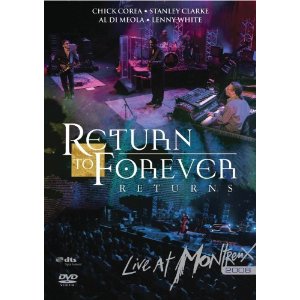 The first disc I chose was, Return to Forever’s Returns: Live at Montreaux recorded 2008. This reunion of one the most popular and successful “fusion bands” of the 70’s was highly anticipated by its fans and the press. Those of you old enough to have seen the band back in the day like myself, can attest to the fact that it was quite an exciting band of pioneers of the genre: Chick Corea, Al Di Meola, Stanley Clarke and my friend and one of my many inspirations, Lenny White. This concert contains many of the bands repertoires from its albums of the 70’s and I picked track seven, “No Mystery,” as my test piece. This concert was filmed in a fairly dark and dimly lit but warm venue. The first thing I noticed after treating the disc with the DE2 was that the picture and the sound had more sharpness to it. The dark colors were just deeper and richer and the details like hair strands seemed more noticeable. These improvements were very subtle and I’m sure that on a state-of-the-art playback system with 5.1, HD Blu Ray, etc. it would be quite a bit more apparent.
The first disc I chose was, Return to Forever’s Returns: Live at Montreaux recorded 2008. This reunion of one the most popular and successful “fusion bands” of the 70’s was highly anticipated by its fans and the press. Those of you old enough to have seen the band back in the day like myself, can attest to the fact that it was quite an exciting band of pioneers of the genre: Chick Corea, Al Di Meola, Stanley Clarke and my friend and one of my many inspirations, Lenny White. This concert contains many of the bands repertoires from its albums of the 70’s and I picked track seven, “No Mystery,” as my test piece. This concert was filmed in a fairly dark and dimly lit but warm venue. The first thing I noticed after treating the disc with the DE2 was that the picture and the sound had more sharpness to it. The dark colors were just deeper and richer and the details like hair strands seemed more noticeable. These improvements were very subtle and I’m sure that on a state-of-the-art playback system with 5.1, HD Blu Ray, etc. it would be quite a bit more apparent.
The other DVD I tried was a little harder for me to notice a difference. This was my son, Dylan’s disc, Michael Jackson’s Live In Bucharest: The Dangerous Tour. First of all, I wouldn’t say it had state-of-the-art sound. I noticed it had no audio settings where one could choose between stereo with Dolby, surround sound, etc. As for the video portion, it was typical stadium concert material that was not what I would consider “Hi-Def,” although again, my system wouldn’t be able to take me there anyway. My son thought he noticed a little improvement in clarity, but again, it was very subtle.
In conclusion, I would say that the Steinmusic DE2 CD Enhancer is a very worthy tool for extracting the most from your discs. Those with audio and especially video systems of high caliber have the ability to really exploit what it does: improve clarity in sound and picture, in a very pleasing way. It does not, for example, make discs sound bright, harsh, or any other negative term for revealing detail, the way some components, cables and speakers do at the expense of a more natural presentation of tone and timbre. I really enjoyed my time with it and I think you will too.

![]()
Steinmusic DE2 CD Enhancer
Price: $699.00
Steinmusic Ltd. Hingbergstr, 103, D 45468 Muheim
US Distributor: Fidelis high-end
Contact: Walter Swanbon
14 East Broadway, Derry, NH 03038
Phone: 603.437.4769
Fax: 603.437.4790
Email: info@fidelisav.com
![]()
Don’t forget to bookmark us! (CTRL-SHFT-D)
Stereo Times Masthead
Publisher/Founder
Clement Perry
Editor
Dave Thomas
Senior Editors
Frank Alles, Mike Girardi, Russell Lichter, Terry London, Moreno Mitchell, Paul Szabady, Bill Wells, Mike Wright, and Stephen Yan,
Current Contributors
David Abramson, Tim Barrall, Dave Allison, Ron Cook, Lewis Dardick, John Hoffman, Dan Secula, Don Shaulis, Greg Simmons, Eric Teh, Greg Voth, Richard Willie, Ed Van Winkle, Rob Dockery, Richard Doran, and Daveed Turek
Site Management Clement Perry
Ad Designer: Martin Perry


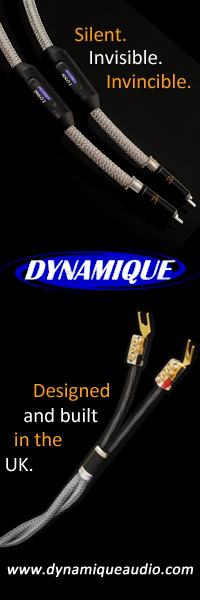
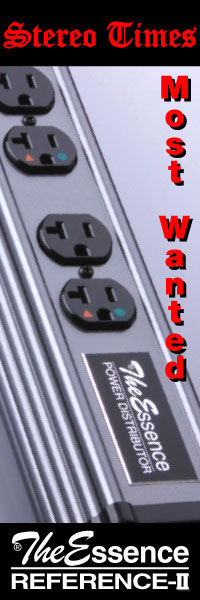
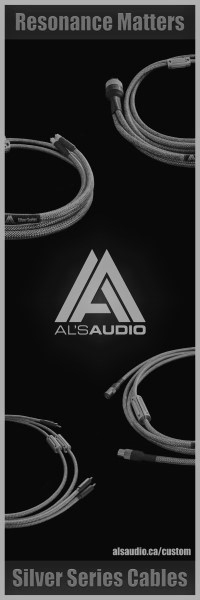
Be the first to comment on: The Steinmusic DE2 CD Enhancer